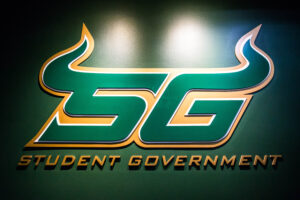SG moves one step closer to consolidation

With consolidation going into effect July 1, 2020, Student Government (SG) will undergo major changes to its current structure under a single constitution for all three campuses — Tampa, St. Pete and Sarasota-Manatee.
This will include changes to the student body president and vice president election during the general body elections.
SG has had separate but fully operational governing bodies for each campus with its own constitutions since it was established.
Tampa senators discussed an amended constitution on Oct. 11., which outlined the structure of a consolidated student government.
The Senates of each campus have to vote on a final constitution by Oct. 25 before the general body elections in the spring.
During elections, students will vote for candidates from their respective campuses.
According to Tampa Senate President Salud Martinez, the future of the Activity and Service (A&S) fee is still undecided. He said that the administration hasn’t given any updates regarding the fee structure post-consolidation.
“We know that they’re probably going to do one big A&S fee, that’s what we’ve been hearing, but we’re still waiting on administration,” Martinez said.
Under a consolidated university, SG will be split into federal and local levels. The executive, legislative and judicial branches will still remain but with a few additions.
The federal executive branch will consist of one student body president and vice president representing all three campuses, as well as an attorney general, solicitor general, chief financial officer and chief of staff. The elected president will also be appointed as a member of the Board of Trustees.
On the local level, the executive branch will have three governors representing each campus with the goals to preserve the culture and traditions of each campus while making decisions that best represent their needs.
While the governors will oversee more specific issues on each campus, such as Bulls Blitz — free rides to the USF football home games — and Pastries with the President for the Tampa campus, the student body president will be in charge of making systemwide decisions.
The executive branch will not be the only one seeing changes to its structure.
After consolidation goes into effect, the weekly Senate meetings will be comprised of representatives from each campus, according to Martinez. The federal legislative branch will consist of 60 senators representing all three campuses and each campus will have a guaranteed five seats in the Senate.
The remaining 45 seats will be based on population percentage. This means Tampa will end up with approximately 44, St. Pete with nine and Sarasota-Manatee with seven seats, according to Martinez.
In regards to the election process, Martinez said that there’s a chance of not having the elections organized by college since academic departments will be merged after consolidation. Instead, candidates running during elections might be chosen by class.
For instance, a college of arts and sciences senator would instead represent the sophomore class.
Martinez, however, said no decisions have been finalized.
When asked where the Senate meetings were going to be held, Martinez said that while no decisions have been made yet, there will be a possible rotation system in which each meeting will take place at a different campus each week.
On the local side of the legislative branch, SG will create three campus councils in charge of confirming the local executive branch positions, funding local organizations and student outreach to the campus. The council chair has to be a senator and from their respective campus.
In total, there will be 60 senators and 27 council members — nine members per campus.
The federal judicial branch will consist of a chief justice, senior justice and ranking justice. It will consist of nine associate justices from the three campuses — five from Tampa, two from St. Pete and two from Sarasota-Manatee.
At the local level, the judicial branch will have campus circuit courts, in which each one of them will consist of a chief judge in charge of overseeing local issues at each campus, such as parking appeals.
According to Martinez, the SG statutes are also being rewritten, with a deadline for January.
“Nothing has been solidified just yet,” Martinez said. “We’re trying to figure out the basic structure and that’s our priority right now. We will get this constitution passed and then work out the kinks with more people involved.”







